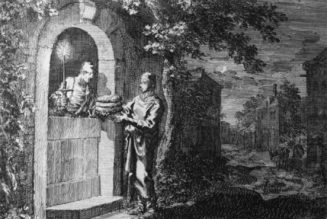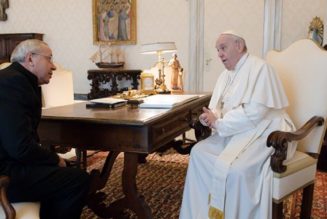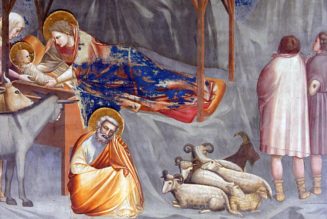
I recently read some sermons from St. Sharbel (1828-1898). I was blown away by his depth of spirituality and practical human wisdom. Drawing from his experience of monastic life, his pastoral ministry, and his final 23 years if life as a hermit, he came to understand the human heart at a deep level. Now in heaven, he seems to be one of those chosen miracle workers who (in designs known only to God) has become a “go-to” Saint in time of need.
Here in the United States, Sharbel Makhlouf is not exactly a household name. But he is immensely and intensely popular among those who know him. I first learned about him 25 years ago from my crazy Lebanese friends (you know who you are!). In many ways, Sharbel is in the Maronite Catholic Church what St. Anthony or St. Thérèse are in the Roman Catholic Church. You find their statues and shrines in churches everywhere – usually with multiple votive candles blazing and possibly even with keepsakes or personal mementos left behind. Half the pilgrims are storming heaven for help in time of need, and the other half are pouring out their thanksgiving for prayers answered. It seems that God chooses certain Saints to be heavenly miracle workers, close companions and friends to us here below, still bearing fruit in our lives as we learn from them to trust and surrender more deeply.
I remember visiting Mexico City in 2001 and noticing shrines of Sharbel in several of the churches there. These were not Lebanese churches. Somehow this obscure Arab monk and hermit had found his way into the devotional life of everyday Mexicans. The abundance of ribbons plastering the wall around him bore testimony that these Mexican Catholics had discovered a new and well-trusted heavenly friend. In that word-of-mouth culture, word got around that this is a Saint who gets things done.
Personally (and in this blog post) I am less interested in Sharbel’s miracles worked from heaven than I am in the divine wisdom he imparted while on earth. His preaching is profound.
In one of his homilies, Sharbel offers the image of a ship setting out on a great voyage across the sea. Man is born from the heart of God and destined to return to the heart of God. Any time we allow ourselves to watch and to listen with deep attentiveness, we notice that movement – in our own heart and all around us. We hear that voice beckoning us to cross the ocean and come home.
But the ocean is scary, and our ship is still moored to the dock, held fast by many ropes. We untie several of the ropes with ease, but there tend to be one or two that we simply don’t want to untie. We resist. We insist that things will be more stable and secure if we keep those ropes tied fast.
Sharbel reminds us of our deeper truth: “The ship is destined to cross the sea and not to remain in port. It is made to navigate far and wide. It is necessary to untie all its ropes; if even one of them remains, it will prevent it from leaving the port.”
Four centuries earlier, St. John of the Cross made the same observation. A bird that has its leg tethered cannot fly free. It matters not whether it is a large chain or just a tiny thread– until it is severed the bird will not be free to fly.
Why is it so hard for us to untie all the ropes and put out into the deep? I have struggled so often with surrendering the last of my ropes to the Lord. I willingly reorder so many things in my life and make great sacrifices – but resist and resist letting go of that last thing or two. It’s a false security, rooted in ungodly self-reliance and pride.
Sharbel cuts through these lies with simple and effective words: “All security is an illusion without the peace of Christ.”
Our own best efforts usually leave a few ropes still tied fast. Sharbel encourages us to allow God’s Word, which is living and effective, sharper than any two-edged sword, to set us free: “Let the Word of God release you from your bonds by breaking them one after the other, even if it causes you suffering. Do not stagnate in your inclinations and thoughts, even if they offer you rest and security … Do not fear to free yourself from the shore and to leave the port; give yourself up to God in order to free yourself from your chains.”
How? How can we surrender in this way when it can feel so impossible? Sharbel urges us to deep and serious prayer. “One who prays lives out the mystery of existence, and one who does not pray scarcely exists.”
He is not so much talking about reciting prayers as allowing ourselves to enter into deep silence, to be drawn into the movement back to the Father. He describes the experience: Listen humbly. Understand deeply. Witness modestly.
When we listen attentively, we begin to understand deeply. We realize and feel the truth that we are but a drop of water amidst the great current that leads back to God the Father. Apart from that volume of water, we are but a drop; within it, we find that we can keep moving back to him. We find that there is peace amidst the great movement – one that we do not in any way control. Sharbel gently but firmly admonishes us, “Do not agree to be outside this movement.”
That movement is always there, in the depth of our heart. But we so often prefer to step outside of our own heart – seeking false rest and security in things that will never satisfy. Sharbel warns us, “Rest far from the heart is a deception.”
In God alone be at rest, my soul. When I am tempted to let myself be tied down to false ports, pretending to offer me safety, may the Lord give me the trust and fortitude that I need to untie all the ropes and set sail on this great voyage back to the Father’s heart.
___________________________________________________



![Following UK Prime Minister Boris Johnson’s Catholic wedding, the task of announcing new Anglican bishops will fall to someone else [London Times paywall]…](https://salvationprosperity.net/wp-content/uploads/2021/06/following-uk-prime-minister-boris-johnsons-catholic-wedding-the-task-of-announcing-new-anglican-bishops-will-fall-to-someone-else-london-times-paywall-scaled-327x219.jpg)





